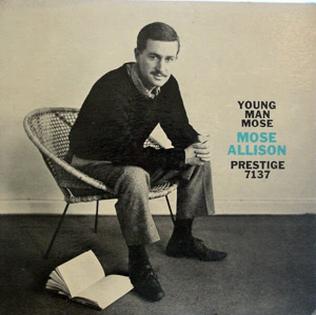My first thought was that maybe Prestige didn't exactly know what to do with Allison. Why suddenly come out with an album of standards and sort-of-standards, with only one Allison original? But I think they did know what to do with him, and his Prestige years are an important part of his legacy. Young Man Mose shows off his roots as much as Back Country Suite does, but a different set of roots. This is the Mose Allison who came to his city home in New York, the serious jazz musician, influenced by Bud Powell and George Wallington, who played gigs with Stan Getz, Gerry Mulligan and Phil W
 oods, recorded with Al Cohn and Zoot Sims.
oods, recorded with Al Cohn and Zoot Sims.For all the different musical emphasis, Young Man Mose follows a pattern set out in his first two albums: a bunch of piano trio instrumentals, a couple of vocals, and one cut featuring him on trumpet. As his recording career went on, he would lose the trumpet, start featuring more vocals, and develop a reputation as one of the important songwriters of his era, combining witty, sophisticated lyrics with his rootsy piano and vocal style -- a sort of funky Dave Frishberg. He was already becoming known as a songwriter from his first two albums, but those songs--"Blues" and "Parchman Farm" were both blues, and didn't even really hint at the range he would develop.
So what about these songs? I started, in a recent entry on Gene Ammons, musing about the body of material that in literature is known as the canon, and in popular music has come to be called The Great American Songbook, and which was mostly being kept alive by jazz musicians during the 50s.. In the top forty radio era, otherwise known as the rock 'n roll era, certain artists and songs came to be pigeonholed as "one-hit wonders," and there was always a derogatory edge to this, though there shouldn't have been. If someone produces one memorable song, that's one more than most of us will ever do.
But there are one-hit wonders in the Great American Songbook, too. Those songs weren't all written by Gershwin and Kern and Porter. Allison touches on a few of them here.
"Somebody Else Is Taking My Place" was a trio effort: bandleader Russ Morgan, who contributed to one other notable song ("You're Nobody Till Somebody Loves You"), and (Bob Ellsworth and Richard Howard, who had none, unless you count Howard's "Shut the Door, They're Coming Through the Window."
Fred Hamm was a cornet player who took over the leadership of the Edgar Benson Orchestra, and neither Hamm nor Benson is much remembered today, though the Benson Orchestra did hire the young Frankie Trumbauer and Gene Krupa. Hamm and three bandmates wrote "Bye Bye Blues," which is remembered.
"I Told Ya I Loved Ya, Now Get Out" isn't exactly a standard, but it's had a few covers, and was written by three Jimmy Dorsey orchestramates, one of whom was Herb Ellis. "I Hadn't Anyone Till You" is by Ray Noble, probably mostly remembered as a radio bandleader, but his contribution to the GASB is not negligible: it also includes "Cherokee" and "The Very Thought of You."
Ellington, the Gershwins and Richard Whiting represent the Olympians. The GASB is circumscribed by time: the 20s, 30s and 40s. Ray Charles falls outside its purview, and not many progressive jazz musicians would have added him to the canon in 1958, but time has shown that he's second to none in importance. Good call by Mose to include him.
If I'm going to choose a favorite on this album, I guess it'll be Messrs. Morgan, Ellsworth and Howard. It's not the best song on the album, but I love what Mose does with it.
"Don't Get Around Much Any More" was issued as a single, on the flip side of the iconic "Parchman Farm," and it was also tapped for double duty on LP when Prestige put together a compilation album of Mose's vocals, titled, appropriately enough, Mose Allison Sings.
Listening to Prestige Vol. 2, 1954-1956 is very close to release. Order your advance copy from tad@tadrichards.com


No comments:
Post a Comment